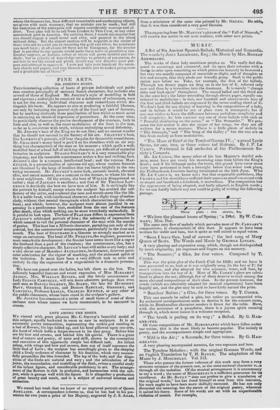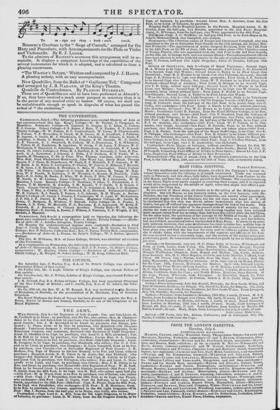MUSIC.
A Set of Six Ancient Spanish Ballads, Historical and Romantic. The words by JOHN LOCKHART, Esq. ; the Music by Mrs. ROBERT ARKWRIGHT.
The works of these lady musicians perplex us. We really feel dis. posed to encourage and commend, and we open their volumes with a (lesiva to seize upon something on which praise can honestly be bestowed ; but they are usually composed of materials so slight, and of thoughts so few and meagre, that they elude our friendly grasp. Such is the publi- cation now before us. Take, for example, the first of the ballads. Through ten dreary pages we drag on in the key of C, relieved only now and then by a transition into the dominant. It is merely "change sides and back again" throughout. The second ballad and the third are in the same key ; the latter extending through eleven pages, equally un- relieved by modulation : in fact, one hundred and ninety-seven bars of the first and third ballads are engrossed by the never-ending chord of C, We don't look for any display of learning in the compositions of a lady, and in ballads it would be out of place were it attempted ; but if any one wishes to learn the difference between melodious simplicity and dull simplicity, let him contrast any one of these ballads with such as " Peaceful slumbering on the ocean," or " The Streamlet." We pre-. same the fair author is also the singer of her songs, for they are all written for a mezzo soprano. There is a little gleam of melody in "The Serenade," and " The Song of the Galley ;" but the rest are as free from melody as from modulation.
"The Muse of Grief at the Tomb of George IV.;" a grand Lyric Scene, for one, two, or three voices (ad libitum). By J. P. DK CAMUS. Performed in full orchestra at the Philharmonic So- ciety's Conceits. Mr. LE Cast us, like many other of his late Majesty's dutiful sub- jects, must have got ready his mourning some time before the King's death ; and if his titlepage spoke the truth, this grand lyric scene must have been performed at least a fortnight before that event took place, the Philharmonic Concerts having terminated on the 14th June. Who Mr. LE CAM US is, we know not ; but that respectable publishers, like CRANE It and Co. shouldhave suffered their names to stand connected with so stupid and barefaced a falsehood, is marvellous. The composition has the appearance of being adapted, and badly adapted, to English words ; for we can hardly believe any one could be guilty of writing the following passage.
" We love the pleasant hours of Spring; " a Duet. By W. CAR* NABY, MRS. Doc.
The seism easy flow of melody which pervades most of Dr. CARNABY'S compositions, is characteristic of this duet. It appears to have been written for treble and bass, but is quite as well suited to equal voices.
"Soon I leave thee, land of sorrow ;" the last song of Mary Queen of Scots. The Words and Music by GEORGE LINLEY.
A very pleasing and expressive song, which, though not distinguished by much originality, yet impresses and lingers on the memory.
" The Seasons ;" a Glee, for four voices. Composed by T.
COOKE.
This was the prize glee of the Catch Cub for 1E29; and we have it now presented to us, both as it was originally sung (in the key of F) for men's voices, and also adapted for two sopranos, tenor, and bass, by transposition into the key of A: Most of Mr. COOKE'S glees are calcu. hated to please the ear, although few of them deserve to rank among the more elevated compositions of their class. In the present instance, the words (which are admirably adapted for musical expression) have been happily set, and the glee may be said to have fairly earned the prize.
" Bacchus' Rubies ;" a Glee, for three voices. By T. Comm This can scarcely be called a glee, but rather an accompanied trio. Its orchestral accompaniments seem to destine it for the concert-room, while its Bacchanalian character renders it fittest for the table. Here, with the assistance of a pianoforte, there is a joyous spirit running through it, which must insure it a welcome reception.
" The broisk is purling on its way ;" a Ballad. By G. HAR- GREAVES.
Of those compositions of Mr. HARGREAVES which have fallen under our notice, this is the most likely to become popular. The melody is pretty, and the accompaniment simple and appropriate.
"Mild is the Air ;" a Serenade, for three voices. By G. HAR- GREAVES.
A very pleasing accompanied terzetto, for two sopranos and bass.
The Tyrolese Melodies ; with the original German Words, and an English Translation by T. H. BAYLY. The adaptation of the Music by J. MOSCHELES. VOL III. Those who possess the former volumes of this work may form a very accurate estimate of the present one, as the same national character mats through all the melodies. Of the musical arrangement it is unnecessary to say a word ; the name of MoscstELes is a sufficient guarantee for its excellence. As Mr. BAYLY "does not profess to give a translation of the original words," but has freed himself at once from this restraint, his work ought to have been more skilfully. executed. .He has, not only discarded the meaning, but the metre of the original poetry, wherever it suited his fancy. Some of his words are set with an unpardonable violation of accent. For example,
To re • sign my shep herd - ess's crook.
ROSSINI's Overture to the" Siege of Corinth," arranged for the Harp and Pianoforte, with Accompaniments for the Flute or Violin and Violoncello. By E. 'J. LODER.
To the admirers of Rossixt's overtures this arrangement will be ac- ceptable. It displays a competent knowledge of the capabilities of the several instruments for which it is adapted, and is calculated to form a pleasing concertante.
"The Warrior's Return," Written and composed by J. J. HAITE. A pleasing melody, with an easy accompaniment.
New Quadrilles, from the Ballet of " Guillaume Tell." Composed find arranged by J. B. NADAUD, of the King's Theatre. Quadrille de Contredanses. By FLAMINI DUVERNAY. These sets of Quadrilles are said to have been performed at Almack's. If so, they have received a much surer passport to notoriety than it is in the power of any musical critic to bestow. Of course, we shall not be unfashionable enough to speak in dispraise of what has passed the ordeal of " the exclusives."



























 Previous page
Previous page